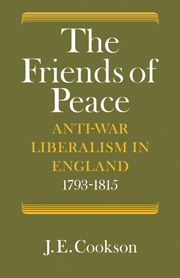Book contents
2 - THE WARRING UNIVERSE
Published online by Cambridge University Press: 07 October 2011
Summary
War as one of the most prominent activities of mankind easily found a place in the tableau of European thought from the time of the Renaissance. It was a subject which was closely connected with the problem of man's intellectual and moral capacities and also with the study of his social and political organisation. Nevertheless, thinking about war showed little development from the sixteenth to the nineteenth century. No one strayed far from the premise, firmly rooted in the Christian tradition, that war was a manifestation of the moral imperfection of humanity. At the end of the period Kant and Glausewitz stand out because the one–in his essay Perpetual Peace–gave the eradication of war serious philosophical attention and the other considered war purely as a state activity. Their predecessors, in comparison, were confounded by war as a social phenomenon. The ideologues of progress who were prepared to argue that war had become ‘civilised’, because regulated by the rules and conventions of a ‘law of nations’, exposed themselves to the retort that its frequency had not been reduced and that its scale, geographical and economic, had much increased. In the eighteenth century it became difficult to deny that the states of Europe had made war into an instrument of policy–the growth of national debts, the growth of standing armies, conscription, colonial conquests were all manifestations of the increasing militarism of European society. War, in fact, challenged the optimism of the Enlightenment at a fundamental level. It suggested the indefiniteness and ineffectiveness of universal rules of justice, the incorrigibility of governments and the unchanging wickedness of human nature.
- Type
- Chapter
- Information
- The Friends of PeaceAnti-War Liberalism in England 1793–1815, pp. 30 - 52Publisher: Cambridge University PressPrint publication year: 1982

